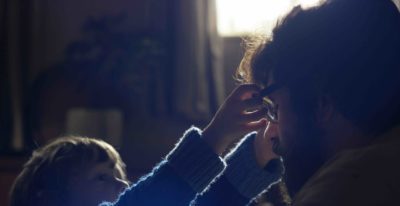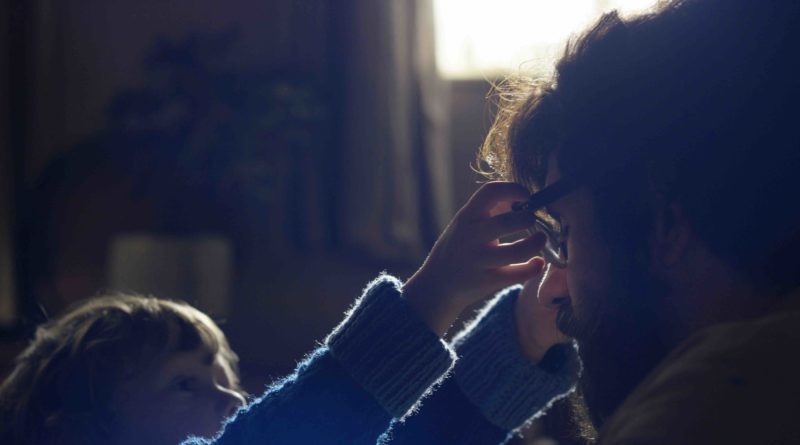INTERVIEW: ‘Notes on Blindness’ depicts one man’s transformation

Notes on Blindness, the remarkably original and poignant new film playing at New York City’s Film Forum, is a detailed exploration of the world of theologian John Hull, who died in 2015 but left a legacy of powerful words and reflections on sight, blindness and the connections between the two.
The film is part audio documentary and part acted drama from directors Peter Middleton and James Spinney. The visuals in the movie include Dan Skinner playing John Hull and Simone Kirby playing Marilyn Hull. However, when Dan and Simone act their parts and speak, the audio played in the movie is the actual audio of John and Marilyn from real life. The directors spliced together sound from John’s audio diaries, plus interviews with the married couple to make an artful and completely effective lip-synching project.
The result is a 90-minute reflection on one man’s journey through obstacles and triumphs, setbacks and acceptances. In the end, Notes on Blindness proves to be a wonderfully new combination of multimedia storytelling, and it leaves a lasting impression.
The feature film began a few years ago with a shorter project that both John and Marilyn were involved in. “We came across John’s book, a book called Touching the Rock, which was published in the early 1990s,” Middleton said recently in a phone interview. “It’s sort of a transcript of these audio diaries that he kept.”
The audio cassette tapes detail John’s loss of sight in the 1980s. He would speak into the recorder and offer his thoughts on his experiences, his new realities and how his family was dealing with the changes.
The filmmakers reached out to John, who let them listen to the cassette tapes, which hadn’t been played for three decades. “We began assessing this material and realized quite early on the kind of scope of it,” Middleton said. “It’s an incredible account … far more extensive than what actually made it into that book.”
The first collaboration among Middleton, Spinney and the Hulls resulted in a three-minute film called Notes on Blindness: Rainfall, which explores John’s experience with rainfall and how he listens and feels the multi-layered patterns of falling rain.
“The New York Times got wind of that and commissioned a slightly longer version, a 12-minute version, which incorporates a couple more passages from John’s diary, one where he talks about the recession of visual memory, and how the memories of his wife and his young children are in a sense fossilized in the past, and growing faint and then fade altogether,” Middleton said. “So that came in 2014, and then from there that really allowed us to get the kind of momentum together to get the feature version.”
Spinney said he is impressed by John’s commentary on loss of sight and ability to deconstruct a single idea or concept. “One diary I think might be about the loss of smiles, or the loss of eye contact or the loss of these visual memories,” Spinney said. “I think from very early on, we felt that it would need a feature-film treatment. … I think we found in the short-film versions, we could only hint at that wider journey, which I think he summarized as the fact when he first lost his sight, he didn’t actually feel that he was a sighted person who couldn’t see. And his brain was still kind of hungering for a visual experience much as the lungs might gasp for air, but by the end of the diaries he’s kind of come to reconceive the entire experience as a gift. That felt like something that really needed to be told over a 90-minute period really, especially to be able to capture all those different stages.”
The decision to lip-synch the original audio with the visuals of the actors was a move to preserve the authenticity of the Hulls’ voices, Spinney said. “We knew that John’s recordings had to be front and center, and that it had to be a story told in his voice and his words, and in the voices of the family,” Spinney said. “However, because it was set 30 years in the past, and it was a very internal journey, we thought we needed to find a way to be able to follow him into that exploration of his dreaming life, his memories.”
He added: “It was certainly informed by a film called The Arbor by Clio Barnard, which uses this lip-synching technique, although uses it quite differently. It’s less naturalistic, and so we actually sought out the same casting director as The Arbor, Amy Hubbard, who helped us. … However, all along the way, there certainly was no real guarantees that it would come off, but we felt confident in the approach. I guess there was an aspect of hoping. I think we were blessed working with Dan and Simone.”
The short films, Middleton said, were integral for the directors to test out some of these cinematic techniques. The previous projects also helped achieve a new visual style and aesthetic. When one watches Notes on Blindness, there’s an obvious appreciation for the experiences and life of John while he’s losing his sight and after his final visuals are relegated solely to memory. The images on the screen mimic the early disorientation and eventual beauty of John’s changing perspective on his senses.
“There was quite a lot of footage of John to draw on actually,” Spinney said. “There was some really, really good television documentaries made about John following the publication of his book in the 1990s, which had lots of footage again kind of navigating, walking around, a lot of lecturing and in interviews. So Dan was able to really study John’s movement. … Of course, Simone was able to meet Marilyn. The whole process was slightly marked by the fact that very sadly John actually passed away about two weeks into the shoot … which actually really changed the project in many ways because it felt like a real collaboration with John throughout the process.”
There’s a personal quality to Notes on Blindness that is rarely achieved by either documentaries or acted dramas. This may have to do with hearing John’s words, which were not necessarily intended for a public audience.
“I think John didn’t originally intend for his accounts to be published,” Spinney said. “He started keeping diaries just as a personal document, as an attempt to make sense of this. He felt if he didn’t learn to understand that blindness would destroy. It was only actually a few years after he stopped keeping the diaries that he started to wonder if it might be of use to other people. He mentioned in the forward to the book that he hopes by sharing his account there’s an attempt to communicate across the abyss that divides different worlds of experience I suppose, in terms of finding the common humanity. … I think certainly that’s what we found when we were approaching his diaries was such an exciting prospect the fact that the account looks both ways. It deconstructs visual experience and sighted experience, and by losing it, John has to kind of try and pick how the visual plays into our sense of identity, our communication, our sense of intimacy, but also it then becomes an account of discovery of new dimensions in sound and new forms of perceptual experience. And so we would hope that audiences take something of John’s attempts to communicate different worlds of experience.”
The film has a companion virtual reality experience called Notes on Blindness: Into Darkness, which is currently being shown at New York City’s Jump Into the Light cinema. Having the film be accessible to blind audience members was an important objective for the filmmakers.
“[John] says in the forward to his book not only is he attempting to communicate the blind experience to sighted readers but also hopes that his account, though it’s individual to him, and it’s just his experience, he hopes that by showing his account it could be useful to other people, it could provide companionship to other people,” Spinney said. “We thought it was crucial that these films would be rewarding for both blind and partially sighted audiences as well. So we began working with some leaders in the fields of accessible cinema and looking at creative ways to make the film a rewarding experience for audiences.”
By John Soltes / Publisher / John@HollywoodSoapbox.com
Notes on Blindness is currently playing the Film Forum in New York City. Click here for more information.

